[高考英语]短文改错多词考点归纳
高考短文改错知识点总结
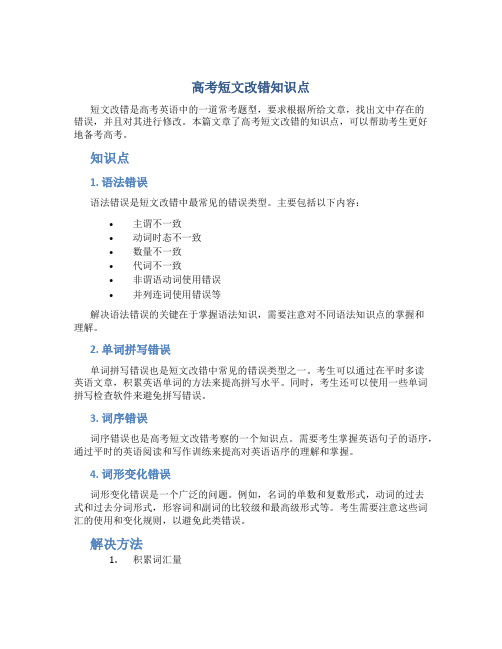
高考短文改错知识点短文改错是高考英语中的一道常考题型,要求根据所给文章,找出文中存在的错误,并且对其进行修改。
本篇文章了高考短文改错的知识点,可以帮助考生更好地备考高考。
知识点1. 语法错误语法错误是短文改错中最常见的错误类型。
主要包括以下内容:•主谓不一致•动词时态不一致•数量不一致•代词不一致•非谓语动词使用错误•并列连词使用错误等解决语法错误的关键在于掌握语法知识,需要注意对不同语法知识点的掌握和理解。
2. 单词拼写错误单词拼写错误也是短文改错中常见的错误类型之一。
考生可以通过在平时多读英语文章,积累英语单词的方法来提高拼写水平。
同时,考生还可以使用一些单词拼写检查软件来避免拼写错误。
3. 词序错误词序错误也是高考短文改错考察的一个知识点。
需要考生掌握英语句子的语序,通过平时的英语阅读和写作训练来提高对英语语序的理解和掌握。
4. 词形变化错误词形变化错误是一个广泛的问题。
例如,名词的单数和复数形式,动词的过去式和过去分词形式,形容词和副词的比较级和最高级形式等。
考生需要注意这些词汇的使用和变化规则,以避免此类错误。
解决方法1.积累词汇量积累足够的词汇量是短文改错中解决问题的关键。
考生应该经常阅读英语文章,边读边记,并掌握不同的单词用法和变化规则。
2.锻炼语法知识在语法方面,考生应掌握基本的语法知识,包括:主谓一致、时态、代词、介词、非谓语等语法点。
对于每个语法点,考生应该了解其意义和用法,并记忆其相应的句法规则和结构。
3.增加写作训练在实践中,考生应该增加写作练习,尤其是关于文章中常见错误的改错练习。
对于练习中的问题,考生需要通过细致的阅读和思考,找到错误所在,同时对错误进行适当的修改和补救。
4.留出检查时间在解决错误时,考生需要有清楚的思路和正确的方法。
一般来说,建议将修改时间留在考试结束前的5分钟,检查一遍文章,找出可能存在的错误并尽可能进行修改。
,短文改错在高考英语中是一个必考的考试题目。
高三英语短文改错知识点

高三英语短文改错知识点高三是学生们备战高考的关键时期,英语短文改错是高考中常见的题型之一。
掌握常见的短文改错知识点对于学好高中英语非常重要。
下面将列举一些常见的高三英语短文改错知识点供大家参考。
1. 定冠词和不定冠词的使用错误。
例如:I want to be an teacher. 正确写法是:I want to be a teacher.(把“an”改为“a”)2. 名词单复数的错误。
例如:Our teacher give us many advices. 正确写法是:Our teacher gives us many pieces of advice.(把“advices”改为“pieces of advice”;把“give”改为“gives”)3. 动词时态的错误。
例如:Yesterday, I go to the library. 正确写法是:Yesterday, I went to the library.(把“go”改为“went”)4. 形容词和副词的混用错误。
例如:He runs quick. 正确写法是:He runs quickly.(把“quick”改为“quickly”)5. 介词和介词短语的错误。
例如:I am interesting on playing basketball. 正确写法是:I am interested in playing basketball.(把“interesting”改为“interested”;把“on”改为“in”)6. 并列连词的错误使用。
例如:I like both reading as well as drawing. 正确写法是:I like both reading and drawing.(把“as well as”改为“and”)7. 代词的错误使用。
例如:Every students should bring their own books. 正确写法是:Every student should bring his or her own book.(把“students”改为“student”;把“their”改为“his or her”)8. 时态和语态的错误。
高考英语短文改错考点归纳

高考英语短文改错考点归纳有的同学在学英语的时候,在短文改错部分总是遇到困难,那么英语短文改错有哪些考点呢?接下来是小编为大家整理的高考英语短文改错考点归纳,希望大家喜欢!高考英语短文改错考点归纳介词和动词的用法短文改错对介词的考查主要涉及在及物动词后接宾语时误加介词和在不及物动词后接宾语时漏加介词、可直接用作状语的副词短语前误加介词、介词与其他词的常用搭配、常用介词的基本用法、习语中的介词用法等。
动词考点归纳的是除动词时态与非谓语动词之外的动词考点,它包括被动语态、情态动词、动词形式的变化、动词用法辨析、动词be 的误加与漏用等。
(介词)真题单句归纳:(1) Suddenly we caught sight at a car and some men. (at 改为 of,catch sightof是习语,意为“看见”) (全国卷)(2) When I have free time I go a long walk.(go 后加 for,go for a walk是习语(全国)(3) It was very kind for them to meet me at the railway station. (for 改为of,注意句型It‘s kind of sb to do sth) (全国卷)(4) I was so tired that I fell asleep at the moment my head touched thepillow. (去掉 at,the moment 在此用作连词,相当于 as soon as)(全国卷)(5) I feel sorry to him. (to 改为 for,be / feel sorry for sb 意为“为某人感到难过”)(动词)真题单句归纳(1)Books may be keep for four weeks. (keep 改为 kept,因此处要用被动语态(全国)(2) They eager to know everything about China and asked me lots ofquestions. (eager 前加were,因此处缺谓语动词) (全国卷)(3) I‘d like to your pen-friend, and get to know more about your country.(to 后加 be / become,因 would like后要接不定式,根据句意此处应加 be / become)(全国卷)(4) There will an important game next month. (will 后加be,此处缺谓语动词)(5)We were all left home at an early age.(去掉were,因句中已有谓语动词left,“我们离开家”又是主动,不能再加be) (天津卷)代词考点1、定语从句中的名词已由关系代词取代,再用代词则是多余的。
高考英语单句短文改错讲解及练习老师用
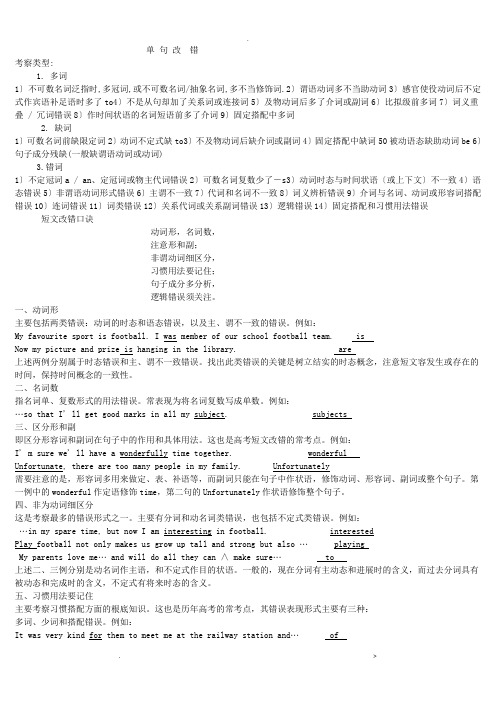
单句改错考察类型:1. 多词1〕不可数名词泛指时,多冠词,或不可数名词/抽象名词,多不当修饰词.2〕谓语动词多不当助动词3〕感官使役动词后不定式作宾语补足语时多了to4〕不是从句却加了关系词或连接词5〕及物动词后多了介词或副词6〕比拟级前多词7〕词义重叠 / 冗词错误8〕作时间状语的名词短语前多了介词9〕固定搭配中多词2. 缺词1〕可数名词前缺限定词2〕动词不定式缺to3〕不及物动词后缺介词或副词4〕固定搭配中缺词50被动语态缺助动词be 6〕句子成分残缺(一般缺谓语动词或动词)3.错词1〕不定冠词a / an、定冠词或物主代词错误2〕可数名词复数少了-s3〕动词时态与时间状语〔或上下文〕不一致4〕语态错误5〕非谓语动词形式错误6〕主谓不一致7〕代词和名词不一致8〕词义辨析错误9〕介词与名词、动词或形容词搭配错误10〕连词错误11〕词类错误12〕关系代词或关系副词错误13〕逻辑错误14〕固定搭配和习惯用法错误短文改错口诀动词形,名词数,注意形和副;非谓动词细区分,习惯用法要记住;句子成分多分析,逻辑错误须关注。
一、动词形主要包括两类错误:动词的时态和语态错误,以及主、谓不一致的错误。
例如:My favourite sport is football. I was member of our school football team. isNow my picture and prize is hanging in the library. are上述两例分别属于时态错误和主、谓不一致错误。
找出此类错误的关键是树立结实的时态概念,注意短文容发生或存在的时间,保持时间概念的一致性。
二、名词数指名词单、复数形式的用法错误。
常表现为将名词复数写成单数。
例如:…so that I’ll get good marks in all my subject. subjects三、区分形和副即区分形容词和副词在句子中的作用和具体用法。
高考英语短文改错答题技巧总结

高考英语短文改错答题技巧总结高考英语短文改错答题技巧1、考生必须熟悉设错方式:多词、少词、错词。
⑴多词现象大多出现在冠词、介词、助动词、连词、语义重复及行文逻辑等方面。
⑵少词现象主要出现在冠词、介词、副词、助动词、不定式符号to、连词等。
⑶错词现象主要在冠词、介词、名词单复数、动词时态、非谓语动词、主谓一致、代词、连词、词形。
2、考生平时应加强基本功训练,用一个“错题集”本把自己或同学在书面表达中出现的错误归纳一下,以便考前复习。
对全文的宏观把握学生应把改错内容当作一篇小短文来理解,这样能对短文有个宏观把握,对上下文有全面的了解。
在理解篇章的基础上逐句审读,分析判断,上下兼顾,把明显的、拿的准的题先做完,这样可以缩小包围圈,也有助于对全文的进一步理解。
高考英语七选五的作答技巧做七选五题目的时候边读边做。
各个问题附近的句子都需要重点阅读,圈画一些线索粗,再从选项中寻找相关的特征词用来判断正确答案。
带入排除法也是一种很好的方法。
做完七选五后,通读全文。
将所选项放入空白处,通读一遍,看看是否与上下文构成语义及逻辑上的直接关系,是否符合该处语境。
1、在七选五阅读过程中,重要要关注*的首段与末段。
尤其是*的这两段的末尾句,因为“开门见山”与“末尾点题”的写作方式是最为常见的,首段的末句一般是全文的主题所在,说明*将探讨哪些内容,并简要指出*的写作思路,有时甚至会以提纲的形式进行呈现。
七选五首段的末句对于快速掌握*的主题具有重要意义,如果它是*的主题句,就可以使读者迅速明确*情节将如何展开,并对*的写作主题有了整体的了解。
如果末句不是主题句,则需要继续寻找。
这时,可以考虑*的写作方式是否为“结尾总结”式,如两者均可排除,则需在*中其他段落寻找主题句,但要注意首段与末段的提示作用。
2、做七选五题目的时候边读边做。
各个问题附近的句子都需要重点阅读,圈画一些线索粗,再从选项中寻找相关的特征词用来判断正确答案。
带入排除法也是一种很好的方法。
高考英语短文改错形容词和副词的考点
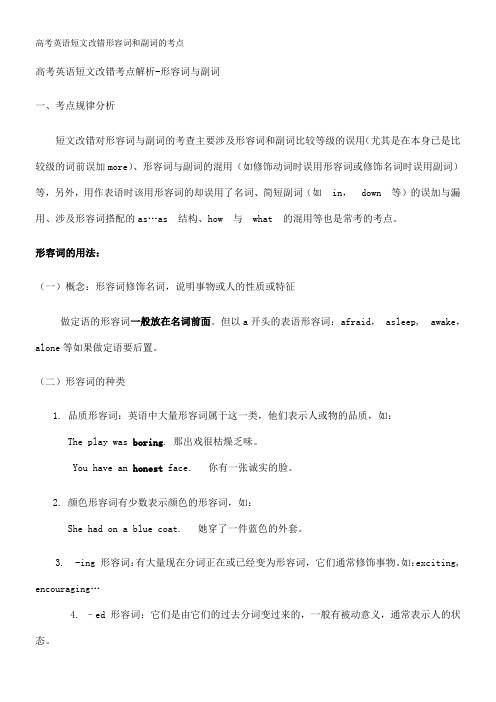
高考英语短文改错形容词和副词的考点高考英语短文改错考点解析-形容词与副词一、考点规律分析短文改错对形容词与副词的考查主要涉及形容词和副词比较等级的误用(尤其是在本身已是比较级的词前误加more)、形容词与副词的混用(如修饰动词时误用形容词或修饰名词时误用副词)等,另外,用作表语时该用形容词的却误用了名词、简短副词(如in,down 等)的误加与漏用、涉及形容词搭配的as…as结构、how 与what 的混用等也是常考的考点。
形容词的用法:(一)概念:形容词修饰名词,说明事物或人的性质或特征做定语的形容词一般放在名词前面。
但以a开头的表语形容词:afraid, asleep, awake,alone等如果做定语要后置。
(二)形容词的种类1. 品质形容词:英语中大量形容词属于这一类,他们表示人或物的品质,如:The play was boring. 那出戏很枯燥乏味。
You have an honest face. 你有一张诚实的脸。
2. 颜色形容词有少数表示颜色的形容词,如:She had on a blue coat. 她穿了一件蓝色的外套。
3. -ing 形容词:有大量现在分词正在或已经变为形容词,它们通常修饰事物。
如:exciting, encouraging…4. –ed形容词:它们是由它们的过去分词变过来的,一般有被动意义,通常表示人的状态。
She looked tired.5. 合成形容词: warm-hearted 热心的, heart-breaking 令人心碎的(三)形容词的用法:常用作定语、表语和补足语,有时也做状语。
形容词在句中的位置:有的形容词放在被修饰的名词之前,称为前置形容词;少数形容词放在被修饰的名词之后,称为后置形容词。
副词的用法:(一)概念:用以修饰动词、形容词或其他副词的词叫做副词。
例如: not(不),here(这里),now(现在)。
不少副词同时也可用作介词或其它词类。
2023年高考英语语法填空与短文改错知识点归纳总结含答案
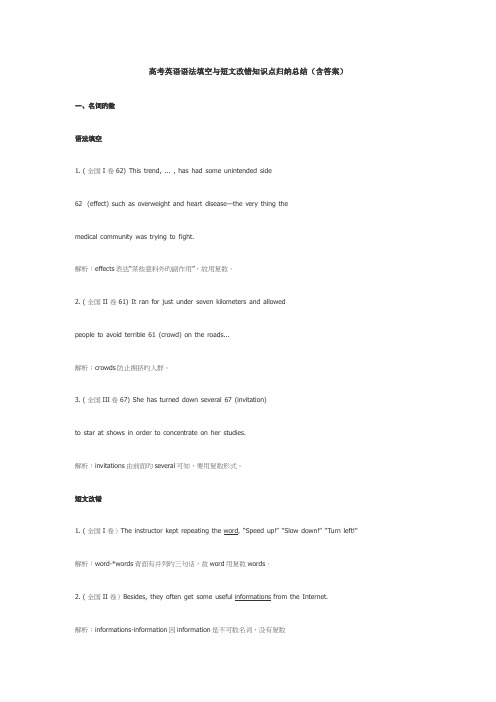
高考英语语法填空与短文改错知识点归纳总结(含答案)一、名词旳数语法填空1. ( 全国 I 卷 62) This trend, ... , has had some unintended side62 (effect) such as overweight and heart disease—the very thing themedical community was trying to fight.解析:effects表达“某些意料外旳副作用”,故用复数。
2. ( 全国 II 卷 61) It ran for just under seven kilometers and allowedpeople to avoid terrible 61 (crowd) on the roads...解析:crowds防止拥挤旳人群。
3. ( 全国III卷 67) She has turned down several 67 (invitation)to star at shows in order to concentrate on her studies.解析:invitations由前面旳several可知,要用复数形式。
短文改错解析:word-*words背面有并列旳三句话,故word用复数words。
解析:informations-information因information是不可数名词,没有复数形式。
二、代词阅读理解Some of the world’s most famous musicians recently gathered in Paris and New Orleans to celebrate the first an nual International Jazz Day...Despite the celebrations, though, in the U. S. the jazz audience continues to shrink and grow older, and the mu sic has failed to connect with younger generations.en the audience for jazz, make the music more accessible, and preserve its history and culture.29. What does the underlined word “that” in Paragraph 3 refer to?A. Jazz becoming more accessible.B. The production of jazz growing faster.C. Jazz being less popular with the young.D. The jazz audience becoming larger.解析:指代前句中即前一段旳最终一句中旳the music has failed to connect 6with younger generations,比较各选项,只有C对旳。
高考英语短文改错考点归纳——错词、缺词、多词
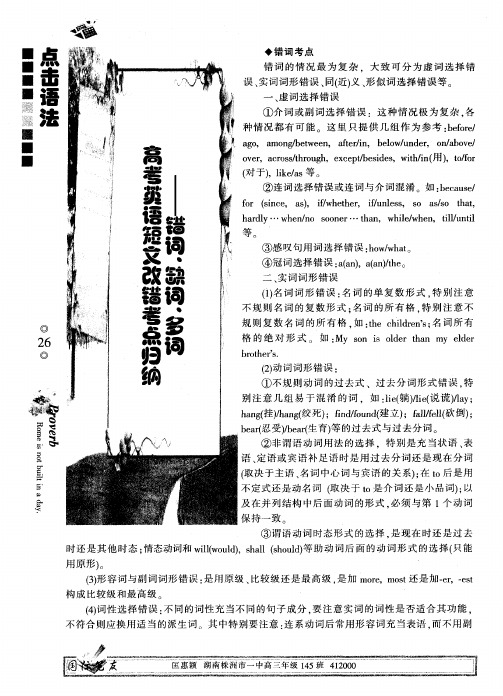
oe,ars tru h x et eie,wt/ ( ) o o v r cos ho g ,e cp/ s s i i 用 ,t fr / b d hn /
中 英 之 .中 旬 学 语 友高 . 刊⑨ 下
词 如 : e fescI.作 状语 用 副词 , H el 0d 而不用 形 容词 。如 : e w rsw l H ok e1 .
三、 同义 词 、 义词 、 近 形似 词选 择错 误
这里举 一 些常 见 的例子 :
a c p r c ie l e l i g l ey l w l t l n / n l ,a o dl u l,a r a yy f t l lo c e t e e v ,a i /i n / v l ,al / ,ao e o ey lu /o d y l d / e s l / v v i o e l e i ,a s /
不 符合 则应 换用 适 当的派 生词 。其 中特别 要注 意 : 连系动 词后 常用 形容词 充 当表语 , 不用 副 而
一
|
…
—
—
ห้องสมุดไป่ตู้
—
—
固穗 ^_ ¨ l 兽 塑 湖 稞 希 年 三 级i ’面 _ l , 南 二 一 年 ~ 面 秀 l _: 枣 l l 高 4 i
◎
规 则 复数 名 词 的所 有 格 , : e c i rnS名 词所 有 如 t hl e’; h d
格 的绝 对 形 式 。 如 : o s odr ta le My sn i le h n my e r d
英语短文改错题的常见考点

英语短文改错题的常见考点短文改错题所设置的错误主要有语法错误和逻辑错误两种,并以语法错误为主。
错误的呈现方式有多词/少词和缺词三种。
多词主要出现在冠词/介词/连词/助动词。
少词主要出现在名词前少冠词,不及物动词或固定结构中少介词,缺少助动词或不定式符号或连词等。
错词主要出现在冠词/介词/连词/名词的单复数/动词的时态及语态/非谓语动词/主谓一致或词类误用等。
现将常见的短文改错题考点及近三年的高考题实例呈现如下;第一部分,与动词相关的考点(一)谓语(1)错误使用时态1、Last summer I go to America and studied at a language school.2. It is five years now since I graduate from No.3 High School.3. Last winter vacation, some of my classmates decide to travel with their friends.4. When they came home, I will show them around my university and the city just as well.5. I grow up in this village, so I know everyone here.6. “Let`s got some more” I said.7.We had to sit at our desks in silence and paid attention to what the teacher were saying.(2)主谓不一致1. One day, while my friend and I was traveling through Germany.2.John Brown is a London taxi driver who love going to the theatre.3.With such stories it make people think about life.4.Both my parents miss you a lot. So do our friend, Cathy.5.The pay were 10 cents per envelope.6.But as soon as the kangaroo were free, it jumped up and ran away with the jacket.7.There is a public library in every town in Britain. Anyone can borrow books if he or she wish.8.He looked up at us and said‘I just want to know what the sign say”.9.Mary together with her two brothers are watching TV.10.I am sure I am not the only fan who want to know things about you.(3)上下文时态不一致1 .When he gets home ,he saw the animal waiting at the door.2.One day in the restaurant where I worked, I am serving a table o f…3.I left school as soon as I can and started work.4.In Grade Eight I took physics.In one test I get only 36 percent…6.We had guests last night who have not stayed in a hotel ago.7.I gained so much confidence that I go back to school as a new person.8.When our six children were young, suppertime is always being interrupted by neighborhood childre n…(4)主被动语态错用1.We hung a sign on the front door that was read “we`re having dinner, come back later.”2.Today, I got a letter that said I had been admitting to a college.3.One day, the school held party, where I invited to talk about Tianjin.4.If I have the honor to be chose to work for the 29th Olympic Games.5.Many high buildings have been appeare d…6.He permitted to retake the test, and I was pulled my grade to an A.(二)非谓语使用错误1.My father was so pleasing that he suggested I go to England for a holiday.2.I`d like to staying there for a month.3.I have often dreamed of talk face to face with you.4.I will do my best to help making the Games a success.5.Which took us a long time prepare.6.We all enjoyed this precious day greatly ,remember the time we spent together.7.And there were many meaningful things that are worth think of.8.We`d better not to miss the chance to enjoy it.9.Surrounding by a group of students, the old professor felt very happy.10.My parents have agreed to visiting me.11.Perhaps someone who wanted see the play would take them.12.Though I had difficulty walk back to my classroom.13.Even the heavy rain in the morning could not prevent us go.14.I want to thank you for helping me becoming a different person.15.We usually work only five hours a day, so we will have plenty of spare time visit the area.第二部分其他常考词类(一)名词名词在改错题中常见的考点是单复数误用和名词所有格运用错误。
高三短文改错知识点
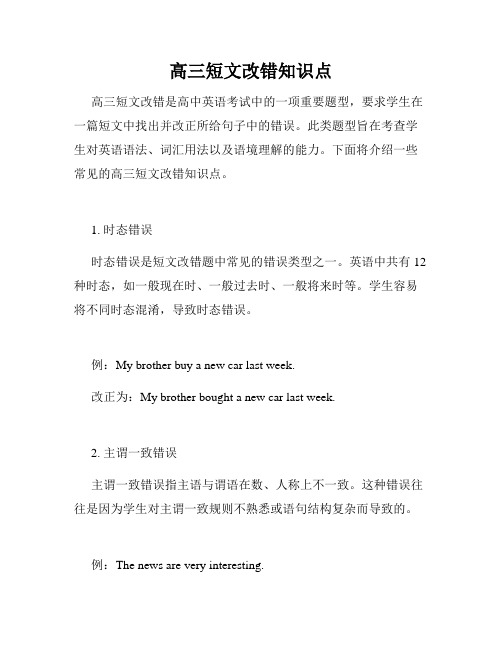
高三短文改错知识点高三短文改错是高中英语考试中的一项重要题型,要求学生在一篇短文中找出并改正所给句子中的错误。
此类题型旨在考查学生对英语语法、词汇用法以及语境理解的能力。
下面将介绍一些常见的高三短文改错知识点。
1. 时态错误时态错误是短文改错题中常见的错误类型之一。
英语中共有12种时态,如一般现在时、一般过去时、一般将来时等。
学生容易将不同时态混淆,导致时态错误。
例:My brother buy a new car last week.改正为:My brother bought a new car last week.2. 主谓一致错误主谓一致错误指主语与谓语在数、人称上不一致。
这种错误往往是因为学生对主谓一致规则不熟悉或语句结构复杂而导致的。
例:The news are very interesting.改正为:The news is very interesting.3. 冠词错误冠词错误主要包括冠词的丢失、多余或误用。
学生对英语冠词的用法不熟悉,容易在句子中使用错误的冠词或不使用冠词。
例:I have eaten apple for breakfast.改正为:I have eaten an apple for breakfast.4. 词汇拼写错误词汇拼写错误是指在短文中出现的单词拼写错误。
这类错误往往是因为学生对生词、规则拼写等不熟悉,导致单词拼写错误。
例:My freind is very kind to me.改正为:My friend is very kind to me.5. 代词错误代词错误包括代词的指代不清、误用和多余。
学生容易在句子中使用错误的代词,或者在句子中过多地使用代词,导致句子不清晰。
例:He gave me a gift, but I didn't liked it.改正为:He gave me a gift, but I didn't like it.6. 并列连词错误并列连词错误是指句子中出现的连接词使用错误或不完整。
2024高考英语短文改错知识点清单与技巧总结
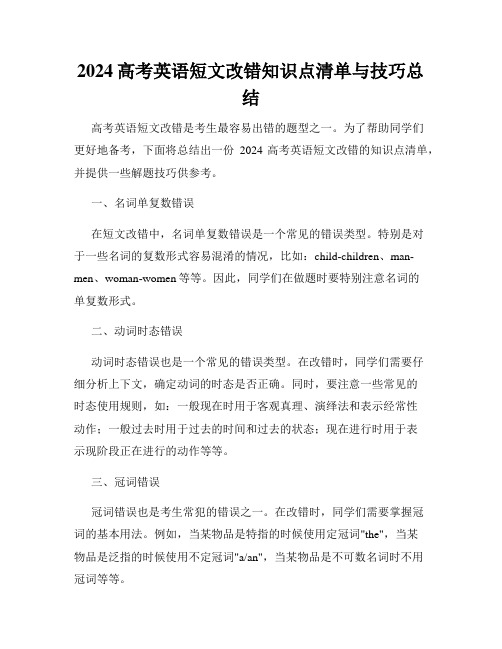
2024高考英语短文改错知识点清单与技巧总结高考英语短文改错是考生最容易出错的题型之一。
为了帮助同学们更好地备考,下面将总结出一份2024高考英语短文改错的知识点清单,并提供一些解题技巧供参考。
一、名词单复数错误在短文改错中,名词单复数错误是一个常见的错误类型。
特别是对于一些名词的复数形式容易混淆的情况,比如:child-children、man-men、woman-women等等。
因此,同学们在做题时要特别注意名词的单复数形式。
二、动词时态错误动词时态错误也是一个常见的错误类型。
在改错时,同学们需要仔细分析上下文,确定动词的时态是否正确。
同时,要注意一些常见的时态使用规则,如:一般现在时用于客观真理、演绎法和表示经常性动作;一般过去时用于过去的时间和过去的状态;现在进行时用于表示现阶段正在进行的动作等等。
三、冠词错误冠词错误也是考生常犯的错误之一。
在改错时,同学们需要掌握冠词的基本用法。
例如,当某物品是特指的时候使用定冠词"the",当某物品是泛指的时候使用不定冠词"a/an",当某物品是不可数名词时不用冠词等等。
四、代词错误代词错误也是高考英语短文改错中常见的错误类型之一。
同学们在做题时要注意代词的指代关系是否明确、单复数是否匹配等问题。
同时,注意一些特殊的代词用法,如:it作形式主语、形式宾语和形式表语;one作人称代词只能用于单数形式等等。
五、形容词与副词错误形容词与副词的错误也是考生常犯的问题。
在短文改错时,同学们需要判断形容词还是副词的用法,并根据上下文来进行判断。
同时,要遵循一些形容词和副词的基本规则,如:形容词修饰名词,副词修饰动词、形容词和副词等等。
六、介词和介词短语错误介词和介词短语的错误也常见于短文改错题中。
同学们在改错时要根据上下文的语境来选择正确的介词。
同时,注意一些常用介词的搭配,如:look forward to、depend on、belong to等等。
英语短文改错题的考点归纳

解题技巧短文改错题涉及的知识点多,覆盖面广,对同学们的综合能力要求高,是高考英语的一大易失分点。
对此,笔者就高考英语短文改错题的考点进行了归纳。
考点之一:用词错误这类错误考查面广,常见的设错点有:①非谓语动词的错用;②形容词与副词的错用;③动词时态、语态、主谓一致的错用;④人称代词主宾格的错用;⑤名词单复数、名词与不可数名词、名词所有格的错用;⑥习惯用法中介词的错用;⑦基数词与序数词的错用;⑧并列连词、从属连词的错用;⑨从句关系代词和副词的错用等。
在解答时,同学们要认真浏览全文,在理解文章大意的基础上整行整句分析,并从词法、句法以及逻辑等方面判断出用词错误。
【例1】①(2020年高考全国卷1)I like eating fry-ing tomatoes with eggs .②(2020年高考全国卷2)Actually,I started to learn kung fu when I was seven years old,for I have long been out of practice.③(2020年高考全国卷3)My mom is really con-cerned with the health of everyone in our families.解析:①考查非谓语动词的准确运用。
句意是:我喜欢吃西红柿炒鸡蛋。
动词“fry ”与“tomatoes ”之间为动宾关系,并非主动关系,所以应用过去分词作定语,故此处的“frying ”应改为“fried ”。
②考查连词的准确运用。
句意是:事实上,我7岁时就开始学功夫了,但我很久没有练习了。
通过分析句子可知,前半句说“我7岁时就开始学功夫了”,后半句说“我很久没有练习了”,由此不难看出,前后语意出现了转折,应用转折关系的连词,故此处“for ”错误,应改为“but ”。
③考查单数名词的运用。
句意是:我的妈妈真的关心我们家里每个人的健康。
高考英语短文改错-常考考点归纳
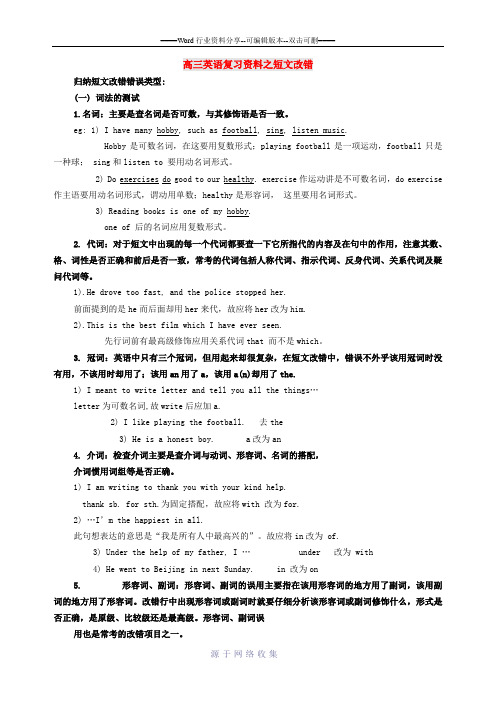
高三英语复习资料之短文改错归纳短文改错错误类型:(一) 词法的测试1.名词:主要是查名词是否可数,与其修饰语是否一致。
eg: 1) I have many hobby, such as football, sing, listen music.Hobby是可数名词,在这要用复数形式;playing football是一项运动,football只是一种球; sing和listen to 要用动名词形式。
2) Do exercises do good to our healthy. exercise作运动讲是不可数名词,do exercise 作主语要用动名词形式,谓动用单数;healthy是形容词,这里要用名词形式。
3) Reading books is one of my hobby.one of 后的名词应用复数形式。
2. 代词:对于短文中出现的每一个代词都要查一下它所指代的内容及在句中的作用,注意其数、格、词性是否正确和前后是否一致,常考的代词包括人称代词、指示代词、反身代词、关系代词及疑问代词等。
1).He drove too fast, and the police stopped her.前面提到的是he而后面却用her来代,故应将her改为him.2).This is the best film which I have ever seen.先行词前有最高级修饰应用关系代词that 而不是which。
3. 冠词:英语中只有三个冠词,但用起来却很复杂,在短文改错中,错误不外乎该用冠词时没有用,不该用时却用了;该用an用了a,该用a(n)却用了the.1) I meant to write letter and tell you all the things…letter为可数名词,故write后应加a.2) I like playing the football. 去the3) He is a honest boy. a改为an4. 介词:检查介词主要是查介词与动词、形容词、名词的搭配,介词惯用词组等是否正确。
高考英语短文改错常考知识点

高考英语短文改错常考知识点高考英语中,短文改错是一道全面考察考生英语语法水平和语感的题型。
因此,我们需要了解一些常见的错误类型和改正方式。
本文将从常见错误类型、语法知识点和解题技巧三个方面来详细介绍和分析。
一、常见错误类型1. 词汇错误此类错误是指考生用错了某个单词的形态或意义,或者不恰当的使用了某个短语。
例如:原句:He seem to be worried about something.改错:He seems to be worried about something.解析:此处动词seem不能用于第二人称和第三人称单数形式,需改为seems。
2. 时态错误考生常常在使用时态时出现错误,例如将过去式用于现在情况,或将现在时用于过去事情。
例如:原句:I forget to bring my book with me yesterday.改错:I forgot to bring my book with me yesterday.解析:此处应该用过去时态,因为时间是过去的事情。
3. 冠词错误冠词错误包括不使用或多余使用冠词、使用错误的冠词等。
例如:原句:I’m going to see the Dr. Smith this afternoon.改错:I’m going to see Dr. Smith this afternoon.解析:在这里,Dr.是一个专业的称呼,不需要加上冠词the。
4. 主谓一致错误主谓一致错误是指主语和谓语在人称、数方面的不一致。
例如:原句:The news on TV are interesting.改错:The news on TV is interesting.解析:news是一个不可数名词,因此应该用单数动词is。
二、语法知识点1. 动词时态英语动词时态繁多,不同的时态表达不同的时间关系。
在修改时,应根据语境选择正确的时态。
例如:原句:He goes to school on foot everyday.改错:He goes to school on foot every day.解析:此处应用一般现在时,表示习惯性动作或真理。
英语高考短文改错知识点

英语高考短文改错知识点一、概览短文改错是英语高考中的常见题型之一,对考生的语法和词汇理解能力有一定的要求。
本文将介绍一些常见的短文改错知识点,以便考生们在备考中能够有针对性地进行复习。
二、词性转换在短文改错中,常会涉及到对词性的转换。
例如,将形容词转化为副词、名词转化为形容词等。
在改错时,考生应特别注意上下文的语法合理性。
例句1:He speaks English good.改正:He speaks English well.例句2:I did my home-work careful.改正:I did my homework carefully.三、冠词使用冠词在短文改错中也是常见的错误点之一。
考生应根据词汇搭配和语法规则的要求,正确使用冠词。
例句1:I want a orange.改正:I want an orange.例句2:He is best teacher in our school.改正:He is the best teacher in our school.四、时态和语态时态和语态是短文改错中较容易出错的地方。
考生应注意上下文的时态一致,并根据需要正确使用主动语态和被动语态。
例句1:I meet my friend at the supermarket yesterday.改正:I met my friend at the supermarket yesterday.例句2:The letter was send by him last week.改正:The letter was sent by him last week.五、单复数形式单复数形式的使用也是短文改错中常见的难点之一。
考生需要根据上下文的要求和词语本身的规则,选择正确的单复数形式。
例句1:She have two cats and three dogs.改正:She has two cats and three dogs.例句2:There is many books on the shelf.改正:There are many books on the shelf.六、固定搭配固定搭配在短文改错中占有重要的比例,考生需要熟悉常见的搭配,以免出现错误。
高考英语考前技能提高—短文改错的解题技巧

高考英语备考—短文改错的解题技巧解题点拨考点1名词和冠词[例1][2021·全国卷乙]I love doing housework.I always assist my parents in doing the dish after meals.考场思维:(1)语境含义:我喜欢做家务活。
饭后,我总是帮助父母洗碗。
(2)根据语法知识分析:名词单复数误用。
短语do the dishes意为“洗碗”。
[例2][2020·全国卷Ⅱ]Luckily,I will go home in two weeks for summer vacations.考场思维:(1)语境含义:幸运的是,两周后我就要回家过暑假了。
(2)根据语法知识分析:summer vacation“暑假”,是单数概念。
例1答案:dish→dishes例2答案:vacations→vacation【过关检测】1.[2021·吉林市第四次调研]Any creative ideas which is about school life is warmly welcomed.________________2.[2020·全国卷Ⅲ]My mom is really concerned with the health of everyone in our families. ________________3.[2019·全国卷Ⅲ]I will open more.I wish to have a chain of cafes in many different city.________________ 4.[2018·全国卷Ⅱ]When I was little,Friday's night was our family game night.________________5.[2020·全国卷Ⅲ]For example,every morning,my dad has to have the bowl of egg soup while I have to eat an apple.________________6.[2019·全国卷Ⅲ]Each of my cafes will have a different theme and an unique style.________________ 7.[2017·全国卷Ⅱ]They live far from the school,and it takes them about a hour and a half to go to work every day.________________8.[2021·江西省质量监测]Only by tasting failure can we enjoy fruit of success.________________1.ideas→idea 2.families→family3.city→cities 4.Friday's→Friday5.the→a 6.an→a7.第一个a→an/one8.enjoy后加the【技法点金】(1)单个名词和不可数的名词要用单数。
高考英语短文改错常考知识点
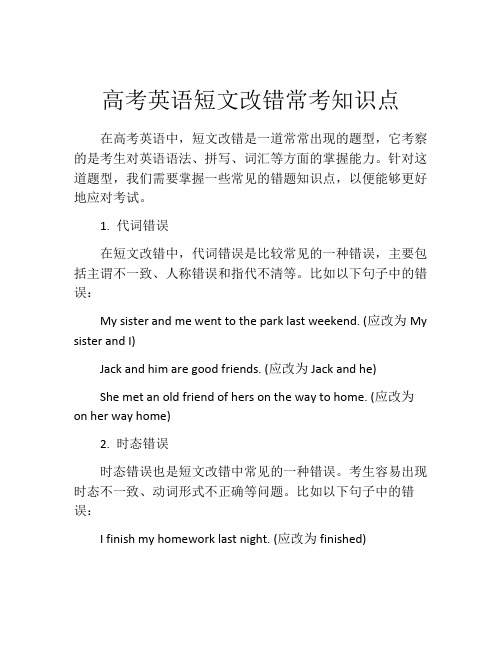
高考英语短文改错常考知识点在高考英语中,短文改错是一道常常出现的题型,它考察的是考生对英语语法、拼写、词汇等方面的掌握能力。
针对这道题型,我们需要掌握一些常见的错题知识点,以便能够更好地应对考试。
1. 代词错误在短文改错中,代词错误是比较常见的一种错误,主要包括主谓不一致、人称错误和指代不清等。
比如以下句子中的错误:My sister and me went to the park last weekend. (应改为My sister and I)Jack and him are good friends. (应改为Jack and he)She met an old friend of hers on the way to home. (应改为on her way home)2. 时态错误时态错误也是短文改错中常见的一种错误。
考生容易出现时态不一致、动词形式不正确等问题。
比如以下句子中的错误:I finish my homework last night. (应改为finished)She is studying English for 3 years. (应改为has been studying)When I arrived at the station, the train already left. (应改为had already left)3. 单词拼写错误另外,在短文改错中,单词拼写错误也是比较常见的问题。
有时候因为疏忽或者没有掌握各种单词的拼写规则而出错。
比如以下句子中的错误:I like to ride my bycicle in the park. (应改为bicycle)The archtecture of the building is very beautiful. (应改为architecture)I am too exhasted to go to work today. (应改为exhausted)4. 词性错误词性错误是指一个单词被误用为其他词性的现象。
高考英语短文改错题型总结语法错误知识点清单与总结
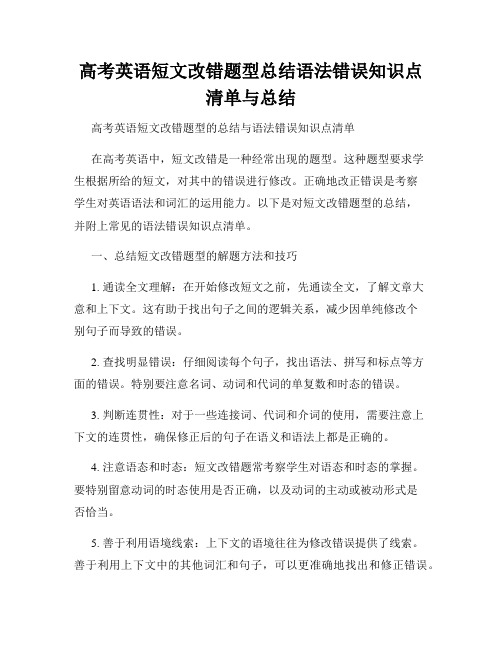
高考英语短文改错题型总结语法错误知识点清单与总结高考英语短文改错题型的总结与语法错误知识点清单在高考英语中,短文改错是一种经常出现的题型。
这种题型要求学生根据所给的短文,对其中的错误进行修改。
正确地改正错误是考察学生对英语语法和词汇的运用能力。
以下是对短文改错题型的总结,并附上常见的语法错误知识点清单。
一、总结短文改错题型的解题方法和技巧1. 通读全文理解:在开始修改短文之前,先通读全文,了解文章大意和上下文。
这有助于找出句子之间的逻辑关系,减少因单纯修改个别句子而导致的错误。
2. 查找明显错误:仔细阅读每个句子,找出语法、拼写和标点等方面的错误。
特别要注意名词、动词和代词的单复数和时态的错误。
3. 判断连贯性:对于一些连接词、代词和介词的使用,需要注意上下文的连贯性,确保修正后的句子在语义和语法上都是正确的。
4. 注意语态和时态:短文改错题常考察学生对语态和时态的掌握。
要特别留意动词的时态使用是否正确,以及动词的主动或被动形式是否恰当。
5. 善于利用语境线索:上下文的语境往往为修改错误提供了线索。
善于利用上下文中的其他词汇和句子,可以更准确地找出和修正错误。
6. 注意文章的逻辑连贯性:修正错误时,不仅要纠正句子中的语法错误,还要维持全文的逻辑连贯性。
即修正错误后,整篇文章在语义和段落结构上应该是自然而流畅的。
二、语法错误知识点清单1. 名词的单复数错误:单数名词缺少冠词、名词的复数形式错误等。
2. 惯用表达错误:固定搭配的短语或词组使用错误。
3. 代词的误用:代词的主、宾格使用错误、代词的单复数形式错误等。
4. 动词时态和语态错误:动词时态使用错误、主谓一致错误、被动语态的错误使用等。
5. 介词和介词短语的使用错误:介词搭配错误,介词短语的位置错误等。
6. 形容词和副词的误用:形容词和副词的比较级和最高级错误使用、形容词和副词的位置错误等。
7. 冠词的使用错误:冠词缺失或多余、冠词的使用错误等。
2020年高考英语全国卷短文改错答案详解及考点分布规律总结
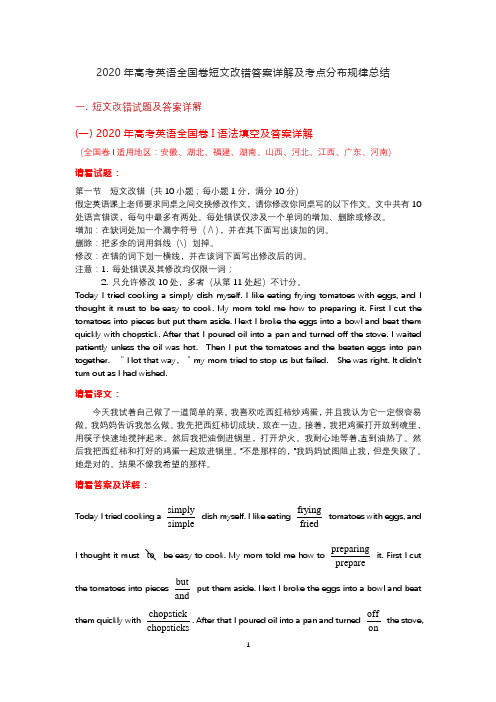
2020年高考英语全国卷短文改错答案详解及考点分布规律总结一. 短文改错试题及答案详解(一) 2020年高考英语全国卷I 语法填空及答案详解(全国卷I 适用地区:安徽、湖北、福建、湖南、山西、河北、江西、广东、河南) 请看试题:第一节 短文改错(共10小题;每小题1分,满分10分)假定英语课上老师要求同桌之间交换修改作文,请你修改你同桌写的以下作文。
文中共有10处语言错误,每句中最多有两处。
每处错误仅涉及一个单词的增加、删除或修改。
增加:在缺词处加一个漏字符号(∧),并在其下面写出该加的词。
删除:把多余的词用斜线(\)划掉。
修改:在错的词下划一横线,并在该词下面写出修改后的词。
注意:1. 每处错误及其修改均仅限一词;2. 只允许修改10处,多者(从第11处起)不计分。
Today I tried cooking a simply dish myself. I like eating frying tomatoes with eggs, and I thought it must to be easy to cook. My mom told me how to preparing it. First I cut the tomatoes into pieces but put them aside. Next I broke the eggs into a bowl and beat them quickly with chopstick. After that I poured oil into a pan and turned off the stove. I waited patiently unless the oil was hot. Then I put the tomatoes and the beaten eggs into pan together. "Not that way ,"my mom tried to stop us but failed. She was right. It didn ’t tum out as I had wished.请看译文:今天我试着自己做了一道简单的菜。
- 1、下载文档前请自行甄别文档内容的完整性,平台不提供额外的编辑、内容补充、找答案等附加服务。
- 2、"仅部分预览"的文档,不可在线预览部分如存在完整性等问题,可反馈申请退款(可完整预览的文档不适用该条件!)。
- 3、如文档侵犯您的权益,请联系客服反馈,我们会尽快为您处理(人工客服工作时间:9:00-18:30)。
高考英语短文改错多词考点归纳
①有些动词在汉语中是不及物动词,在英语中是及物动词,可能多一个介词。
如:serve for the people, follow after him, play with her in a match, marry with her, engage with her,应该把上述介词都删除。
②有些动词可作及物动词,也可作不及物动词,但搭配不同,可能混淆而多一个介词。
如:join in the game, 但join in the club; pay for a TV set, 但pay for three dollars; search for the map, 但search for the thief for his watch
③有些“动词+ 介词”形式的动词后面没有宾语时,后面的介词是多余的。
如:
He looked at but could see nothing.
How are you getting on with?
④有些动词、名词、形容词后接名词或代词时须加一个介词,但接that从句时,必须去掉介词。
如:agree to it, 但agree to that...; be sure of it, 但be sure of that…; be sorry for it, 但be sorry for that…
⑤有些副词或介词词组后加一个介词,组成了复合介词,若后面没有接宾语时,最后的介词则是多余的。
如:
If you won’t go, I’ll go instead of.
He walked out of.
⑥有些连词后加of 成为复合介词,如果后接从句,of 是多余的。
如:Because of he was ill…
⑦地点副词的意义中已经包含了介词to,如果再用to则是多余的。
如:on my way to there, get to home, go to upstairs, return to home
⑧last year, next month, this week, one day等名词词组直接充当时间状语,前面用介词是多余的。
⑨有些动词受汉语意思影响而多一副词。
如:stop down(停下来), raise up (举起来), return back(归来,回来), repeat again (复述)
⑩有些动词在一种用法中要加副词,而在另一种用法中加副词则是多余的。
如:build up our country, 但build up railways
①状语从句与主句之间多一并列连词。
如:though…but; because…so; the more…and the more
②充当状语的分词与主句之间多一并列连词。
如:
Sitting down and he began to work.
Regarded as the best in the class, so he was praised at the meeting.
③从属连词后多一that。
如:because that…since that…, unless that…
④复合宾语前多一that。
如:
I heard that him say it.
I found that her lying on the ground.
①主语与谓语之间多一关系代词。
如:
Some people don’t like football, but many people who do like it.
②作定语的分词前多一关系代词。
如:
I know the boy who standing there.(也可在who 后加is)
The man who invited to the ball last night is my friend.(也可在who 后加was)③定语从句中的名词已由关系代词取代,再用代词则是多余的。
如:
She bought the book (that) she had first asked for it.
I have seen the girl (whom) you are talking of her.
④用不定式作定语时,如果其逻辑宾语或介词宾语就是被修饰的名词词组,后面再用代词是多余的。
如:
The tea is too hot to drink it.
He is a good comrade to work with him.
⑤在“形容词+ 不定式”句型中,如果不定式的逻辑宾语或介词宾语就是句子的主语,再用代词作宾语或介词宾语则是多余的。
如:
This question is too difficult to answer it.
The house is nice to live in it.
⑥在“连词+ 分词/ 名词/ 形容词/ 副词/ 介词词组”结构中,加上代词作主语是多余的。
如:
He took notes while he reading.
If it heated, ice turns to water.
①时间、条件从句中用一般现在时表示将来时,用will, would 是多余的。
如:
If he will try hard, he will succeed.
I’ll tell them about it as soon as they will come.
②be sure 或make sure + that 从句中用一般现在时表将来,用will, would 是多余的。
如:
I make sure that you will come early.
③在宾语从句中主语前的助动词是多余的。
如:
Would you tell me what do you want?
④独立结构中的be(助动词或连系动词)是多余的。
如:
The game was over, he went home.
She smiled, tears were still running down her face.
①与介词at, in, to连用的名词school, class, town, hospital, church, prison, bed 等表示与其有关的活动时,用冠词是多余的。
如:go to the school(上学), be in the prison(坐牢), be in the bed(在睡觉)
②与by 连用的交通工具名称和air, land, sea 等名词前用冠词是多余的。
如:by the bike, by the sea, by the train
③表示游戏活动而不是表示游戏工具的名词前不用冠词。
如:play the / a volleyball, play the chess, play the table tennis
④由“专有名词+ 普通名词”构成的专有名词前不用定冠词。
如:the Beijing Airport, the Oxford Street, the Hyde Park
⑤在一些固定搭配中。
如:at the first, at the last, the most of us
⑥most 作“非常”解时,前面用the 是多余的。
如:
Oh! It’s the most beautiful!
She is the most diligent.
⑦含有Day 的节日前加the 是多余的。
如:the May Day, the Women’s Day, the National day, the New Year’s Day ⑧在“名词+ as / though…”结构中,名词前不用任何冠词。
如:a child as he is / a fool as he is
①在had better, would rather, rather than 后的不定式前用to 是多余的。
如:
You had better not to go.
I would rather to stay at home
②在make, let, have, see, feel, watch, notice, observe 等使役、感官动词后充当宾语补足语的不定式前用to 是多余的。
如:
He made me to do heavy work.
Let me to hear you to play.。
